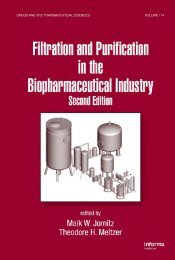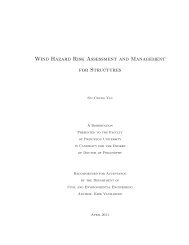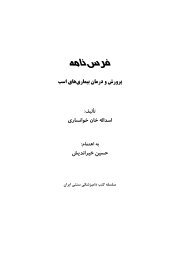Introduction to Fire Safety Management
Introduction to Fire Safety Management
Introduction to Fire Safety Management
You also want an ePaper? Increase the reach of your titles
YUMPU automatically turns print PDFs into web optimized ePapers that Google loves.
<strong>Introduction</strong> <strong>to</strong> <strong>Fire</strong> <strong>Safety</strong> <strong>Management</strong><br />
Recent amendments are also included in the<br />
summaries where appropriate.<br />
The summaries provided focus upon the key areas<br />
relevant <strong>to</strong> this publication as they relate <strong>to</strong> fi re safety<br />
and risk management.<br />
15.3 The Health and <strong>Safety</strong> at Work etc.<br />
Act 1974 (HSW Act)<br />
Often referred <strong>to</strong> as the Primary or Umbrella Act, the<br />
HSW Act details the principal statu<strong>to</strong>ry duties in relation<br />
<strong>to</strong> occupational health and safety.<br />
Supporting regulations made under section 15 of<br />
the HSW Act expand these duties and are referred <strong>to</strong> as<br />
‘subordinate’ or ‘delegated’ legislation.<br />
The HSW Act is divided in<strong>to</strong> four parts:<br />
1. Part 1 covers health, safety and welfare in connection<br />
with work and the control of dangerous substances<br />
and emissions in<strong>to</strong> the atmosphere<br />
2. Part 2 covers the Employment Medical Advisory<br />
Service (EMAS)<br />
3. Part 3 covers amendments <strong>to</strong> Building Regulations<br />
4. Part 4 covers miscellaneous and general provisions.<br />
Parts 2, 3 and 4 are not included in this summary.<br />
15.3.1 General duties<br />
The HSW Act places general duties on all those involved<br />
with work activities including employers, the selfemployed,<br />
persons in control of premises, employees<br />
and manufacturers and suppliers. These general duties<br />
are detailed in sections 2 <strong>to</strong> 9 and the penalties for<br />
breaching the requirements are detailed in section 33.<br />
15.3.2 Section 2 – Duty of the employer <strong>to</strong> their<br />
employees<br />
2 (1) General duty<br />
The employer is required <strong>to</strong> ensure, so far as is<br />
reasonably practicable, the health, safety and welfare at<br />
work of their employees.<br />
2 (2) Specifi c duties<br />
Employers are required <strong>to</strong>:<br />
a) Provide and maintain safe plant and systems of<br />
work<br />
b) Ensure safety in the use, handling, s<strong>to</strong>rage and<br />
transport of articles and substances for use at work<br />
c) Provide information, instruction, training and supervision<br />
as necessary <strong>to</strong> ensure employee safety<br />
d) Provide and maintain a safe place of work with safe<br />
access and egress<br />
346<br />
e) Provide and maintain a safe and healthy working<br />
environment with adequate welfare facilities.<br />
2 (3) Requirement <strong>to</strong> have a written policy<br />
Where the employer normally employs fi ve or more<br />
employees, they must prepare a written statement<br />
covering their Policy for health and safety at work<br />
including the organisation and arrangements for Policy<br />
implementation. The Policy must be kept up <strong>to</strong> date,<br />
revised as necessary and brought <strong>to</strong> the attention of the<br />
employees.<br />
In addition <strong>to</strong> the above duties, section 2 also covers<br />
the appointment of trade union safety representatives,<br />
consultation with these appointees and the establishment<br />
of a safety committee <strong>to</strong> review the employer’s<br />
measures for ensuring the health and safety of their<br />
employees. The <strong>Safety</strong> Representatives and <strong>Safety</strong><br />
Committees Regulations 1977 (SRSC Regs) expand<br />
these particular duties and the Health and <strong>Safety</strong><br />
(Consultation with Employees) Regulations 1996 extend<br />
the duty <strong>to</strong> consult <strong>to</strong> non-union represented employees<br />
(see later summaries).<br />
15.3.3 Section 3 – General duty of the employer<br />
and the self-employed <strong>to</strong> other persons<br />
Employers and the self-employed are required <strong>to</strong> carry<br />
out their undertaking in such a way that, so far as is reasonably<br />
practicable, they do not expose other persons<br />
<strong>to</strong> risks <strong>to</strong> their health and safety.<br />
15.3.4 Section 4 – General duty on persons in<br />
control of premises<br />
This section applies <strong>to</strong> all persons who have control of<br />
non-domestic premises and requires that, so far as is<br />
reasonably practicable, the premises, the access, egress<br />
and any plant or substances provided for use there are<br />
safe and without risks <strong>to</strong> the health of anyone using the<br />
premises, plant or substances provided there whether<br />
for work or not.<br />
It should be noted that common parts of residential<br />
premises are deemed <strong>to</strong> be non-domestic premises and<br />
fall within this section.<br />
15.3.5 Section 5 – Emissions<br />
This section was repealed by the Environmental<br />
Protection Act 1990.<br />
15.3.6 Section 6 – General duty on<br />
manufacturers and suppliers<br />
Section 6 places duties on persons in relation <strong>to</strong> both<br />
articles and substances for use at work.

















